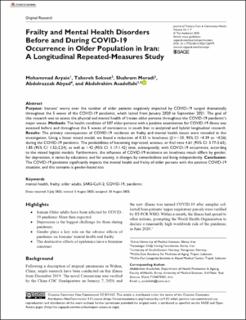| dc.contributor.author | Mohammad, Aryaie | |
| dc.contributor.author | Tahereh, Sokout | |
| dc.contributor.author | Moradi, Shahram | |
| dc.contributor.author | Abdulrazzak, Abyad | |
| dc.contributor.author | Abdolrahim, Asadollahi | |
| dc.date.accessioned | 2022-12-20T08:40:51Z | |
| dc.date.available | 2022-12-20T08:40:51Z | |
| dc.date.created | 2022-12-11T14:55:38Z | |
| dc.date.issued | 2022 | |
| dc.identifier.citation | Aryaie, M., Sokout, T., Moradi, S., Abyad, A. & Asadollahi, A. (2022). Frailty and Mental Health Disorders Before and During COVID-19 Occurrence in Older Population in Iran: A Longitudinal Repeated-Measures Study. Journal of Primary Care & Community Health, 13, 1-7. | en_US |
| dc.identifier.issn | 2150-1319 | |
| dc.identifier.uri | https://hdl.handle.net/11250/3038724 | |
| dc.description.abstract | Purpose: Iranians’ worry over the number of older patients negatively impacted by COVID-19 surged dramatically throughout the 5 waves of the COVID-19 pandemic, which lasted from January 2020 to September 2021. The goal of this research was to assess the physical and mental health of Iranian older persons throughout the COVID-19 pandemic’s major waves.
Methods: The health condition of 507 older persons with a positive examination for COVID-19 illness was assessed before and throughout the 5 waves of coronavirus in south Iran in analytical and hybrid longitudinal research.
Results: The primary consequences of COVID-19 incidence on frailty and mental health issues were revealed in this investigation. Using a linear mixed model, we found a reduction of 0.33 in loneliness (β = −.33, 95% CI −0.39 to −0.26) during the COVID-19 pandemic. The probabilities of becoming depressed, anxious, or frail rose 4.61 (95% CI: 3.77-5.63), 1.85 (95% CI: 1.52-2.24), as well as 1.42 (95% CI: 1.17-1.42) time, subsequently, with COVID-19 occurrence, according to the mixed logistic models. Furthermore, the influence of COVID-19 incidence on loneliness result differs by gender; for depression, it varies by education; and for anxiety, it changes by comorbidities and living independently.
Conclusion: The COVID-19 pandemic significantly impacts the mental health and frailty of older persons with the positive COVID-19 situation, and this scenario is gender-based too. | en_US |
| dc.language.iso | eng | en_US |
| dc.rights | Navngivelse-Ikkekommersiell 4.0 Internasjonal | * |
| dc.rights.uri | http://creativecommons.org/licenses/by-nc/4.0/deed.no | * |
| dc.title | Frailty and Mental Health Disorders Before and During COVID-19 Occurrence in Older Population in Iran: A Longitudinal Repeated-Measures Study | en_US |
| dc.type | Peer reviewed | en_US |
| dc.type | Journal article | en_US |
| dc.description.version | publishedVersion | en_US |
| dc.rights.holder | © The Author(s) 2022. | en_US |
| dc.source.pagenumber | 1-7 | en_US |
| dc.source.volume | 13 | en_US |
| dc.source.journal | Journal of Primary Care & Community Health | en_US |
| dc.identifier.doi | https://doi.org/10.1177/21501319221126979 | |
| dc.identifier.cristin | 2091593 | |
| cristin.ispublished | false | |
| cristin.fulltext | original | |
| cristin.qualitycode | 1 | |

